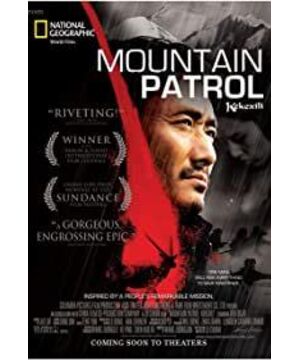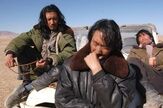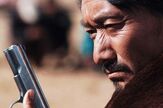This is Hoh Xil, the beautiful girl, the hometown of Tibetan antelope. Here is heaven and here is hell. Everything here has nothing to do with good or evil, right or wrong, only survival and destruction. When the body of the mountain ranger was buried in the sky, what I saw was a shocking contrast to the burial of a typical human society, but also the harmony of man's final return to nature. However, the film shows another shocking scene. The bodies of countless Tibetan antelopes are eaten by hungry vultures, which is primitive and arouses our compassion. As a result, we tend to preconceive the moral framework of real social values to all parties in the film. The poachers are evil, and the mountain rangers represent justice. However, when the patrol team later saw the transporters, fishermen and poachers fighting with each other during the investigation, and even threatened death, and at the same time saw the cunning rebuttals of these so-called prisoners pretending to be innocent, and the mountain patrol The team members hang out with prostitute girlfriends, and the captain bluntly says that he illegally sells sheepskins for survival. I finally know that here, there is no so-called justice and evil, and there is no so-called hero, everyone is a living individual, only representing himself. When there was a shortage of food and fuel, the captain resolutely chose to release the poachers, let them go out on their own, and let nature and fate decide their lives; when the car broke down, the mountain patrol team decided to leave a group to wait for rescue, and this group People's life and death still depend on nature and themselves; when Liu Dong drove back to rescue with supplies, quicksand took him away silently, no one knew, and he returned to nature from then on. It's beautiful and cruel here. In this life, there is the piety of prayer, and the joy of singing and dancing. However, it is more just a struggle, and it will eventually disappear. When the mountain ranger distributes his food to the skinners; when one of the skinners tries his best to save the life of the mountain ranger with his unskilled medical skills; when the poacher finally saves the reporter's life and even points out a way out for him. I still remember the film mentioned that the pilgrims have dirty hands and feet, but their hearts are very pure. Whether it is a mountain ranger or a poacher, their hands are more or less covered with dust and blood, which is filthy, but their hearts are not necessarily muddy. We always blame the greed of poachers, but how much can they get in the whole chain of interests? The mainstream society despises poaching, but isn’t the root of this chain of interests the desire of the mainstream society? At the end of the film, it is mentioned that some countries have successively banned the trading of Tibetan antelopes, but people's desires will not disappear because of legal restrictions. I only hope that the really dirty desires can stay away from such a beautiful place as Hoh Xil, leaving only those who really live here, and continue to live and destroy together with nature.
View more about Mountain Patrol reviews










